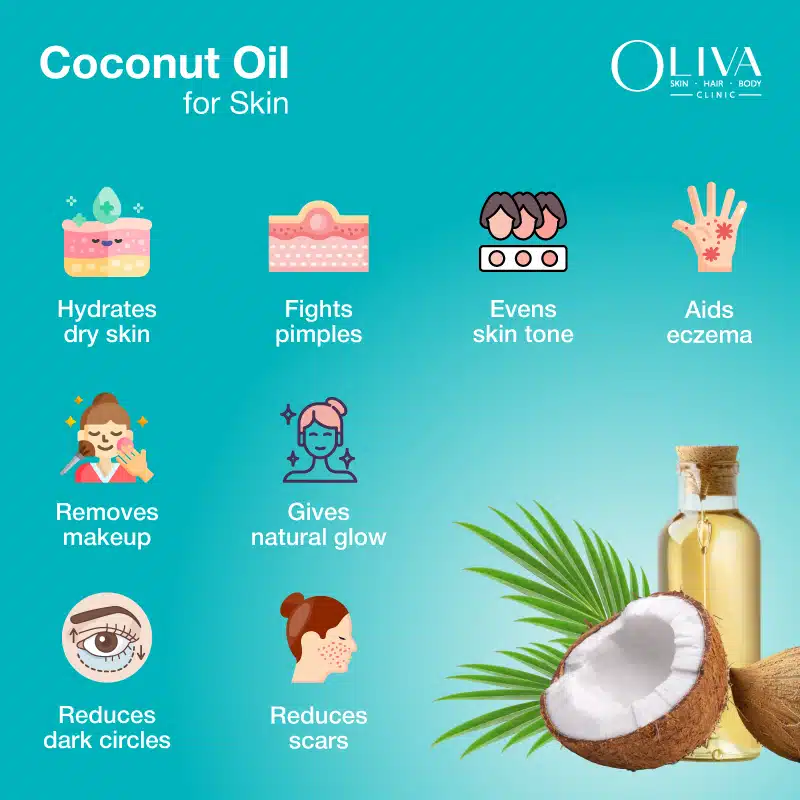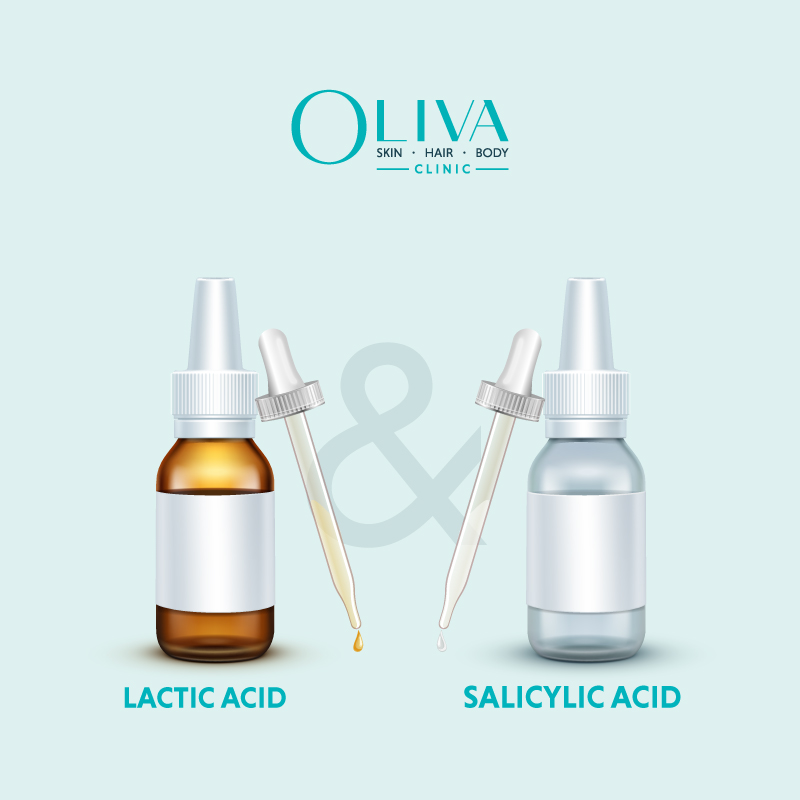In This Article
Coconut Oil for Skin: Benefits, Types & How to Get Glowing Skin
Coconut oil, a natural moisturiser, has been an age-old skin care ingredient in Asian countries. Known for its nourishing properties and potential skincare benefits, this miracle ingredient has gained immense popularity in the beauty industry. From moisturising your skin to accelerating wound healing, coconut oil for skin offers several advantages. But it is not suitable for everyone. This article will guide you through the benefits of coconut oil on the face, including the best ways to incorporate it into your skincare routine and the potential side effects.
In This Article

Is Coconut Oil Good For Skin?
Yes, coconut oil is very beneficial for your skin. It has anti-inflammatory, antibacterial, antimicrobial, [1] antifungal, and antiviral properties that help hydrate the skin, reduce inflammation, treat acne and enhance the skin’s glow. However, one should be aware that coconut oil is comedogenic. That said, it can clog your pores. If you have oily or acne-prone skin, be cautious when using coconut oil on the face, as it can exacerbate acne.
What Is The Best Type Of Coconut Oil For The Skin?
There are different types of coconut oil available based on how they are produced, which can be through wet or dry processing: virgin coconut oil [2] and refined coconut oil. Using the best type will help you enjoy several dermatological benefits.
- Virgin Coconut Oil: It is prepared from fresh coconuts using a gentler processing method that does not include chemicals and additives. This type is unrefined coconut oil, rich in antioxidants and polyphenols. It is beneficial for applying to your skin.
- Refined Coconut Oil: It is made from dried coconuts that undergo a series of processing steps in a machine. Due to the high temperatures used in the extraction process, many antioxidants are removed. Refined coconut oil is more suitable for cooking than for skincare applications.
Benefits of Coconut Oil For Skin
Coconut oil offers numerous benefits for the skin. It effectively addresses various skin concerns, making it a good addition to your skincare routine. Here is a rundown of the advantages of coconut oil:
- Deeply Moisturises Dry Skin: Coconut oil is a natural moisturiser. [3] It has hydrating properties that help retain the moisture in the skin. Applying cold-processed coconut oil improves the skin barrier function and locks in moisture, making it ideal for dry skin.
- Reduces Inflammation: Coconut oil is rich in anti-inflammatory properties that help reduce inflammation, redness, and irritation, which can contribute to conditions like psoriasis or eczema.
- Promotes Wound Healing: One of the standout benefits of using coconut oil for skin is that it accelerates wound healing. When you apply virgin coconut oil to your skin,
- Provides Sun Protection: Applying a thin layer of coconut oil on the face can help protect your skin from the sun’s harmful UV rays. [4] However, it should be used in combination with sunscreen. Coconut oil is not a substitute for sunscreen.
- Improves Skin Elasticity: Coconut oil is rich in fatty acids, particularly lauric acid, which may aid in collagen synthesis. Regularly using coconut oil on your skin helps increase skin elasticity and gives you a youthful complexion.
- Fights Acne: If you are wondering, “Is coconut oil good for acne?” the answer is yes. Coconut oil is rich in antibacterial and antifungal properties that help combat acne-causing bacteria. Its anti-inflammatory properties help reduce redness and inflammation associated with acne. However, people with acne-prone skin should be cautious, as coconut oil can clog the pores.
- Soothes Sunburns: Yet another benefit of coconut oil for skin is that it helps provide relief to sunburned areas. Try applying coconut oil to sunburned skin. It soothes and hydrates your skin.
- Reduces the Appearance of Scars: If you have scars, apply coconut oil and gently massage it into the skin. It helps minimise the appearance of scars by supporting collagen production.
- Improves Skin Tone: If you have hyperpigmentation, dark spots or discolouration, coconut oil can be an effective option. Regular application can help achieve a uniform skin tone and complexion.
- Treats Fungal Infections: Coconut oil has the ability to treat fungal infections. Its antifungal properties treats conditions like athlete’s foot and ringworm.
- Reduces the Appearance of Stretch Marks: One of the significant benefits of coconut oil for skin is it helps reduce the appearance of your stretch marks. The consistent application of coconut oil to the prominent areas of stretch marks gradually minimises their appearance.
- Treats Diaper Rash: Using diapers for your infants can lead to rashes on their skin. Coconut oil can be an excellent alternative to your diaper rash creams. The anti-inflammatory and antibacterial properties of coconut oil soothe irritation and redness on the affected areas.
- Improves Scalp Health: We are all familiar with the benefits of coconut oil for the scalp and hair. Regularly massaging coconut oil into your scalp helps reduce dryness, flakiness, while also improving your scalp health. [5]
- Treats Eczema: Improves Skin Barrier Function
- Provides a Natural Glow: Regularly applying coconut oil to your face and body nourishes your skin, hydrates it and gives a radiant glow.
- Reduces Dark Circles: If dark circles are bothering you, apply a small amount of coconut oil and gently tap it around the delicate eye area. The anti-inflammatory and moisturising properties of coconut oil hydrate the skin and lighten the dark circles.
How To Use Coconut Oil On Skin?
You can maximise the benefits of coconut oil for skin by using it the right way. Improper application of coconut oil for skin can cause more harm than good. Here are some tips to incorporate coconut oil into your skincare routine:
- As a Moisturiser (Face and Body): If you have virgin coconut oil, you can apply it directly to your body right after a shower. Rub a small amount of oil against your neck, hands, elbows, knees and feet. This helps hydrate your skin.
- As a Makeup Remover: You can use coconut oil to remove makeup. Take a cotton pad or ball and apply a small amount of oil to it. Use this to remove makeup, followed by a gentle cleanser.
- As a Lip Balm: If you have dry, chapped or irritated lips, apply coconut oil to your lips. Its hydrating properties moisturise your lips and keep them hydrated all through the day.
Who Should Avoid Coconut Oil?
Although coconut oil for skin offers several benefits, it may not be suitable for everyone. One should exercise caution when using coconut oil. If you have oily skin, avoid using it. Coconut oil may clog pores and lead to excess sebum production. This further contributes to the formation of acne, breakouts and blackheads. Also, individuals with acne-prone skin should avoid it. If you have sensitive skin, use only a small amount of it to prevent clogging or irritation.
Side Effects Of Coconut Oil On Skin
While coconut oil for skin is generally considered safe, it does have some side effects. Here are a few:
- May Clog Pores: Coconut oil is comedogenic. Applying coconut oil on the face can clog the pores and lead to breakouts and acne.
- Greasy Residue: One of the significant side effects of applying coconut oil on face overnight is that it can leave a greasy layer on the skin. There is a chance that it can get transferred onto your bedding.
- Limited Penetration: One of the disadvantages of using coconut oil on the face is that it forms a barrier on the skin. This prevents the deeper penetration of other skincare products that are essential for your skin’s nourishment.
- Exacerbation of Certain Skin Conditions: Coconut oil can worsen already existing skin conditions, like seborrheic dermatitis.
Note: Patch Test:
The best way to apply coconut oil or maximise the benefits of applying coconut oil on face overnight is by performing a patch test. Use the oil on a small area of your body, such as the forearm, and test for any reaction. If there is none, you can continue using it.
Takeaway
Coconut oil is a natural moisturiser that hydrates your skin, reduces inflammation, and helps heal wounds. It offers several benefits to the skin by addressing various concerns. Although it possesses anti-inflammatory and antibacterial properties, it may not be suitable for everyone. Its effectiveness depends on the individual’s skin type and concerns. For the best solution suited for your specific skin concern, consult a dermatologist. They will analyse your skin type and condition and suggest an effective treatment that just works for you. At Oliva, our dermatologists are specialised in offering personalised treatments. Visit your nearest Oliva Clinic today for a consultation with our expert.
Frequently Asked Question On Coconut Oil For Skin
Yes, you can use coconut oil on your skin daily. However, monitor it to see if it suits your skin type and concerns.
Coconut oil is a natural moisturizer that helps restore skin’s glow. Simply warm a few drops of virgin coconut oil and massage it gently onto clean skin before bedtime. You can also mix it with honey or lemon juice as a face pack, or apply it as a body oil after showering to lock in moisture and achieve soft, radiant skin.
Yes, coconut oil is highly comedogenic. It clogs pores, especially for those with oily or acne-prone skin.
Coconut oil has emollient properties that can give your skin a temporary shine. However, it doesn’t improve your skin’s radiance altogether.
If you have acne-prone or oily skin, applying coconut oil to your face overnight is not recommended, as it can clog pores.
No, coconut oil does not darken your skin. However, if you are exposed to the sun directly after applying, it can cause the skin to darken.
No, coconut oil does not brighten the skin on its own. It may help reduce the appearance of dark spots and even out the skin tone.








